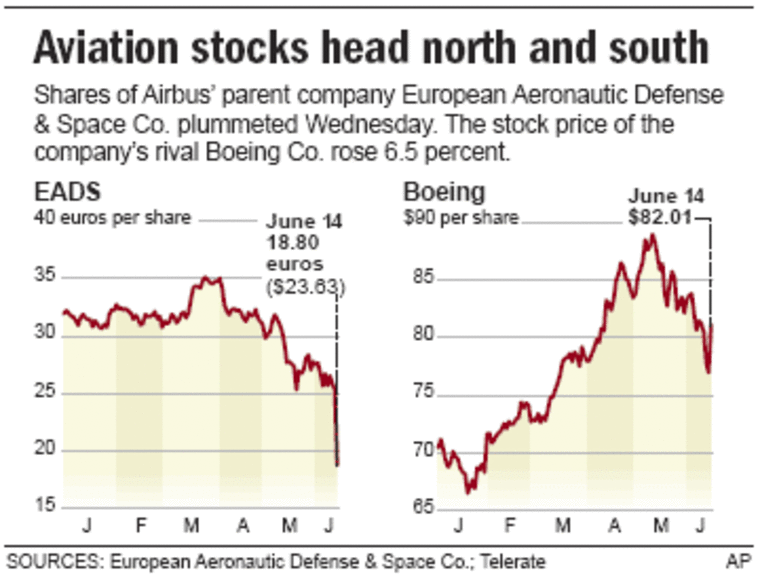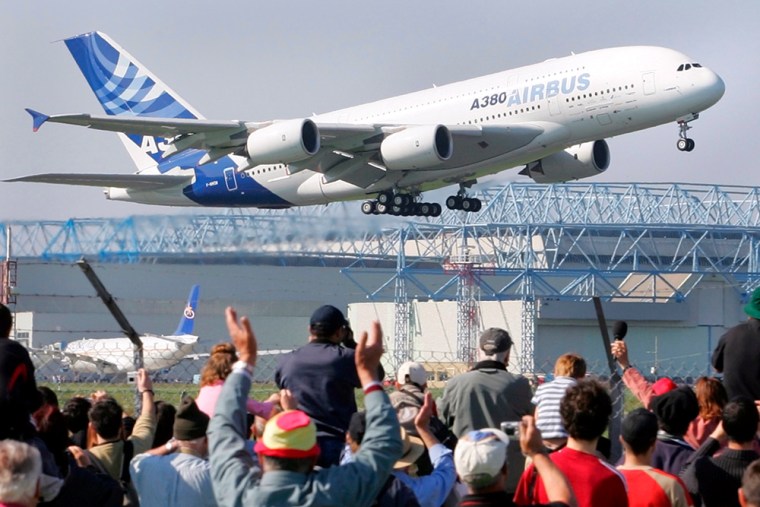Getting the world’s largest passenger aircraft off the ground, a double-decker superjumbo big enough to carry 555 passengers, is taking on crisis proportions for Airbus.
Airlines around the world punished the European aircraft maker on Wednesday for delays in the delivery of its A380 jet, demanding compensation, reconsidering orders — and in one case, striking a major deal with its rival Boeing Co.
Shares in Airbus’ parent company plunged and Boeing’s rose as repercussions of the production problems with the world’s biggest passenger plane resonated throughout the industry.
They also raised questions about Airbus’s management and strategy, and the A380’s future. Boeing is staking its bets on a smaller, more fuel-efficient model.
Singapore Airlines, one of the world’s top carriers and the first to buy the A380, said it was unhappy with the delays Airbus announced late Tuesday. It demanded compensation and, on Wednesday, worsened the blow by announcing it would buy 20 Boeing 787-9 aircraft worth $4.52 billion and take options on another 20 planes.
Emirates Airlines, another sought-after buyer, said it was reconsidering its order of 45 A380s. Australia’s Qantas Airways said it was seeking talks with Airbus over its orders for 12 A380s and wants some of its money back. Malaysia Airlines said it was reviewing terms of its deal for six of the planes.
Airbus parent European Aeronautic Defense & Space Co. saw almost $7 billion in market capitalization evaporate Wednesday after the A380 delay announcement and a warning that operating profit would be cut by about $625 million each year between 2007 and 2010. Its shares plummeted 26 percent to close at 18.80 euros ($23.63).

The dismal day for Airbus reflected a sharp shift in the Toulouse, France-based company’s fortunes since an A380 test model took a triumphant maiden flight last year over the Pyrenees. Airbus overtook Boeing in order numbers in 2001 and in deliveries in 2003 and until recently looked in robust shape.
But the anger fueled by the disclosure of production bottlenecks with the plane’s electrical systems — the second major delay for the $300 million A380 — suggests a less rosy future for the planemaker.
“Boeing is eating Airbus’ lunch, certainly this year. And they’ll do it again next year and for the foreseeable future, unless Airbus can pull a rabbit out of a hat,” said Jim Smith, aviation analyst and editor of Jane’s Transport Finance.
It was the second Airbus project to falter in recent years, after the A350, which it hoped would be the answer to Boeing’s 787.
The Singapore-Boeing deal stung especially deep because Airbus had hoped Singapore Airlines would be one of the first and biggest customers for the A350. But airline dissatisfaction with the A350 has forced Airbus to redesign some of its parts and consider a costly overhaul, delaying its first delivery for several years.
Until recently, Airbus had been able to use the Boeing sales team’s slow response time and other irritations to gain an edge, according to analyst Cai von Rumohr of SG Cowen Securities. But Boeing has in the past year or two greatly improved its sales strategy, he said, meaning the two are competing solely on product.
Airbus insisted Wednesday that it was not the A380 itself but minor production problems at fault for the delay.
“There have been minor production issues which have accumulated into a large number and require a complete, very detailed rethinking of the installation process of wires and harnesses,” said Thore Prang, spokesman for the company in Hamburg. “It has nothing to do with the aircraft.”
With the A380, Airbus was taking a risk, since only a few of the world’s airports have runways long enough and terminals that can be modified to deal with its double deckers, analysts said.
Airbus wagered that the airline industry would increasingly offer large flights to international hubs. But Boeing bet that air travel would be marked by the need for fuel efficiency and long-haul flights and is focusing on the 330-passenger 787.
“EADS made a strategic error by opting for a jumbo-sized jet rather than a fuel efficient model, especially if the price of oil increases further,” said Matthieu Raimbault of French brokerage Viel Tradition.
But SG Cowen Securities’ von Rumohr also cautioned that the 787 could hit snags of its own if there are any further problems with the development of the futurist composite materials that will help make the 787 more fuel-efficient. Last week, Boeing acknowledged that engineers had discovered problems while testing a section of the new airplane, but the glitch is not expected to delay the 787’s entry into service in 2008.
Singapore was the first carrier to buy the A380, ordering 10 with an option to purchase another 15. Airbus said the first delivery to Singapore was still expected by the end of this year.
But deliveries will likely be limited to nine in 2007 instead of the 20 to 25 initially planned, Airbus said, with an additional shortfall of five to nine A380 deliveries expected in 2008 and “around five” in 2009. Emirates Airlines said it was told to expect a six-month delay.
Airbus’ chief commercial officer, John Leahy, confirmed that the company will incur more late delivery penalties, but declined to provide a figure. It could in theory also face order cancellations.
EADS co-CEO Noel Forgeard, who in 2000 oversaw the launch of the A380 as the head of Airbus, deflected suggestions that the setback could cost him his job. “We have now to find the right ways forward,” he said in a conference call Wednesday.
The troubles at Airbus damage the credibility of EADS management and may bleed over into its defense business.
Already they hit BAE Systems PLC, which owns 20 percent of Airbus but has been seeking to sell its stake. BAE dismissed concerns that the Airbus problems would hurt the price it could get for its stake, and its shares came off earlier lows to end the day down 1.1 percent at 345 pence ($6.35) on the London Stock Exchange.
